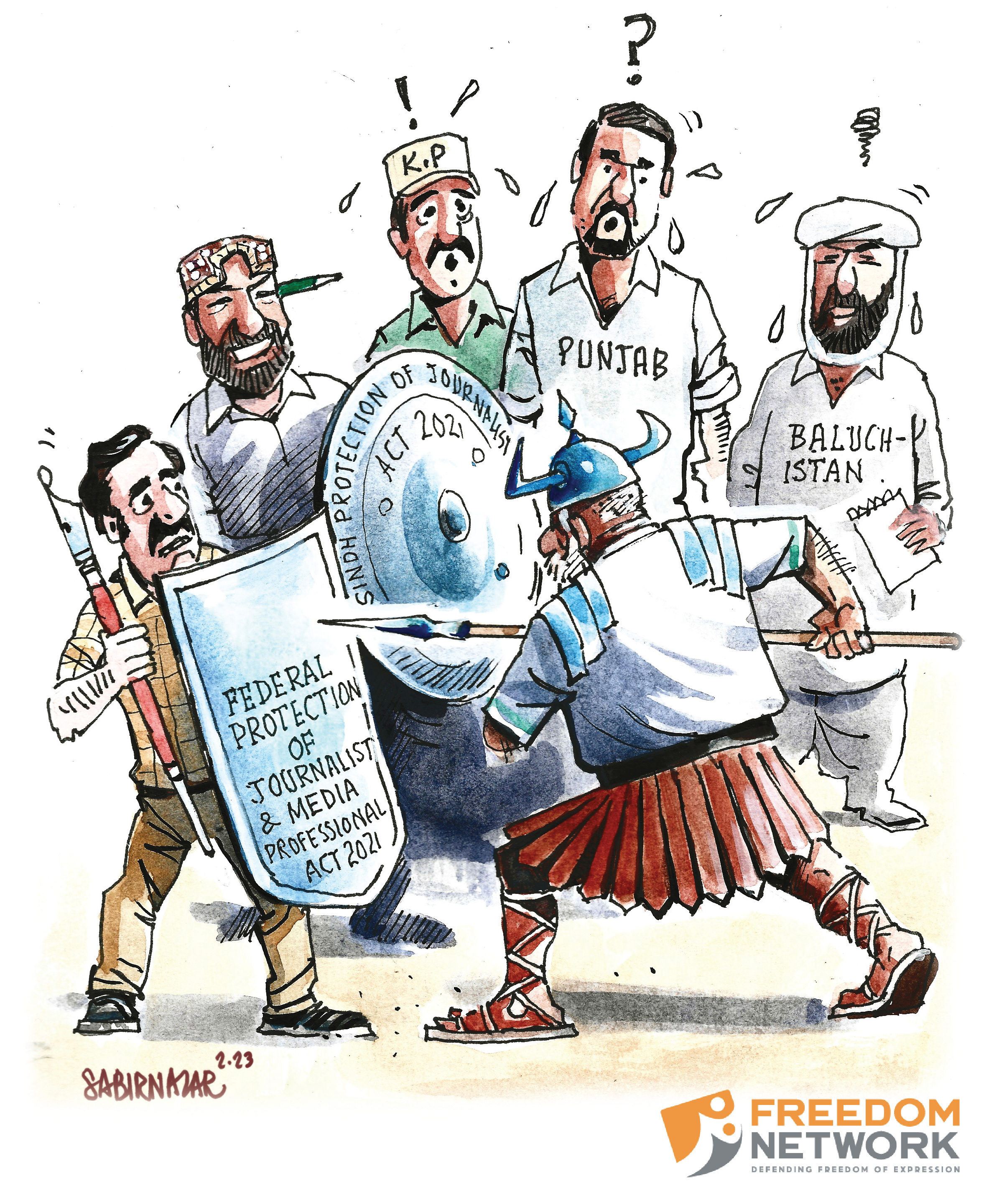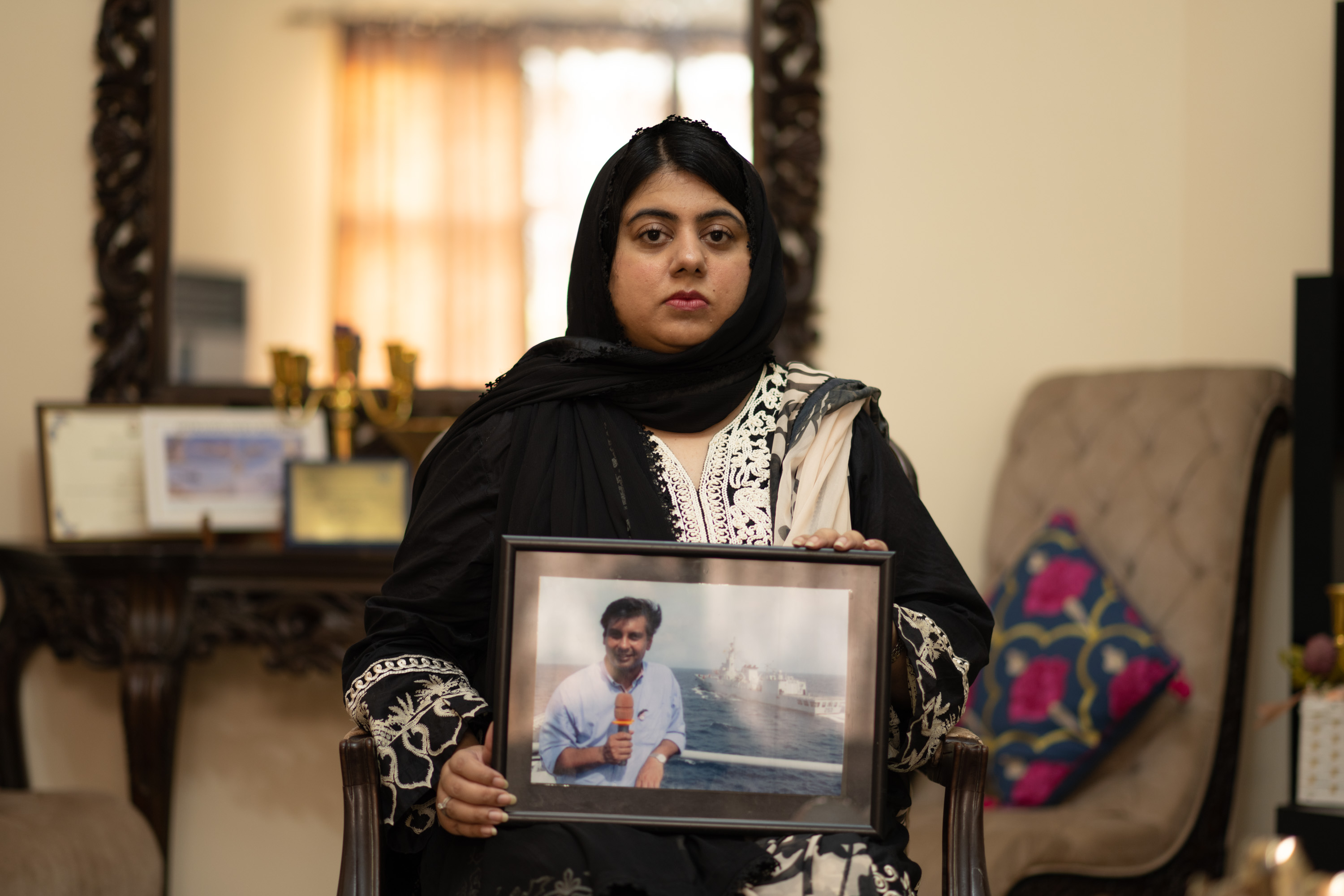International Day to End Impunity for Crimes Against Journalists – Nov 2, 2020
ISLAMABAD: The state of Pakistan has emerged as the single largest predator of journalists when it comes to filing legal cases against them for their journalism work while the legal system of the country is failing to provide justice to journalists in defending themselves against the impunity of this legal onslaught.
These are among several startling findings of a new research study conducted by Freedom Network, a Pakistani media rights watchdog advocating for protection of civil liberties of citizens and journalists, including freedom of expression, right to information and digital rights.
Titled “In Legal Crosshairs: Using the Law to Punish Journalists – Impunity against Journalists facing Legal Cases in Pakistan”, the report was launched on the eve of the annual International Day to End Impunity for Crimes Against Journalists observed globally, including in Pakistan, on November 2.
The findings emerge from an exhaustive analysis of data of 17 journalists in Pakistan against whom legal cases were registered for their journalism work during the period 2018-19. There were many more journalists against whom legal were registered in this period, but Freedom Network could obtain complete data directly from these journalists, including their legal notices, police FIRs and other data, from these 17 journalists only.
“It is alarming that the state functionaries of various government departments have emerged as the main initiators of the cases, indicating adoption of a predatorial attitude of the state of Pakistan against journalists and becoming their enemy number when it comes to lodging legal cases against them,” said Iqbal Khattak, the executive director of Freedom Network while launching the report.
“This state of affairs is alarming and the state needs to both explain itself why it is attacking media and its practitioners as an undeclared but practiced policy and it needs to rapidly de-escalate its targeting of media as a key element of Pakistan’s democratic landscape,” he added.
The study says there were several legal cases registered against journalists in the year 2020 also but these were also not included in the research dataset to allow for at least one year to lapse after registration of cases against them to track the legal justice process of registration, investigation, prosecution and trial to determine whether the legal system of Pakistan allows for a robust combating of impunity of crimes against journalists as they defended themselves.
The key findings of this research on impunity of persecutors filing cases against journalists in Pakistan based on an exhaustive Impunity Index developed by Freedom Network include the following:
Journalists targeted by medium: Journalists in Pakistan working for print media are the most risk to legal cases against them; print media practitioners are twice as likely to be the target of legal action than television media.
The riskiest regions for journalists facing legal cases: Sindh is the most dangerous region for journalists in Pakistan when it comes to registration of legal cases against them. It is three times as risky for journalists as compared to other provinces and federal capital.
Laws being used to target journalists: Most journalists (over one-third) are being charged under various provisions of the Pakistan Penal Code; nearly one-third of the journalists who face legal cases are at risk for being charged under the anti-terrorism law, while they are also at risk of being charged under the electronic crimes law and defamation law.
Criminal allegations being used against journalists: The most frequent allegations (nearly 65%) under which legal cases are registered against journalists include “acting against state institutions” or “defaming state institutions”. In over one-third (35%) of the legal cases against journalists apparently outlandish and frivolous allegations – but which carry serious consequences – are slapped against them, including “illegal possession or arms and explosives,” “drug running,” “keeping banned literature” and even “harassing citizens.”
The most dangerous actors targeting journalists: The state and its functionaries have emerged as the biggest legal threat to journalists in Pakistan with 15 of 17 cases (88.2%) registered by them while law enforcement agencies such as Police and FIA are the single largest (41.1%) type of actor registering legal cases against journalists.
Instruments of legal entanglement: Over two-thirds of all journalists that face legal cases, FIRs are registered against them; the rest receive either formal legal notices or court summons.
Initiators of legal cases against journalists: In nearly 80% of the legal cases filed against journalists, the initiators were affiliated with various government ministries and departments while individual government officials – often senior ranking bureaucrats – are initiators of the cases against journalists.
FIRs against journalists facing legal cases: Most journalists against whom legal cases are filed, find an FIR registered against them.
Actions demanded from complainants: Often more than one action is demanded from journalists from those registering legal cases against them. The most frequent demand (nearly 60%) is proof of allegations printed / posted by journalists in a court of law and the second most frequent (in over one-third of cases) demand is for an apology from journalists.
Legal cases leading to court cases: In only two-thirds of the cases the investigation process by the police was completed and allowed to proceed to court for trial while in one-third cases even the challan was not completed.
Cases declared fit for trial by courts: In the two-third cases in which investigation was completed and landed in court, only about half the cases were declared fit for trial while barely one-third of overall cases were declared fit for trial.
Conclusion of trial in courts: Trials in an overall majority of cases (nearly 60%) never reached conclusion – leaving most journalists without a chance to prove themselves innocent.
Outcome of concluded trials – guilty or innocent: In the few cases where the trial was concluded, the accused journalists were declared innocent and acquitted. However, in overall terms most cases – 10 out of 7, or over 60% – never reached a court or conclusion of trial and, therefore, most of the journalists facing legal cases in 2018-19 never got justice until end-October 2020 till the production of this research study.
Click below link to download full PDV version report


